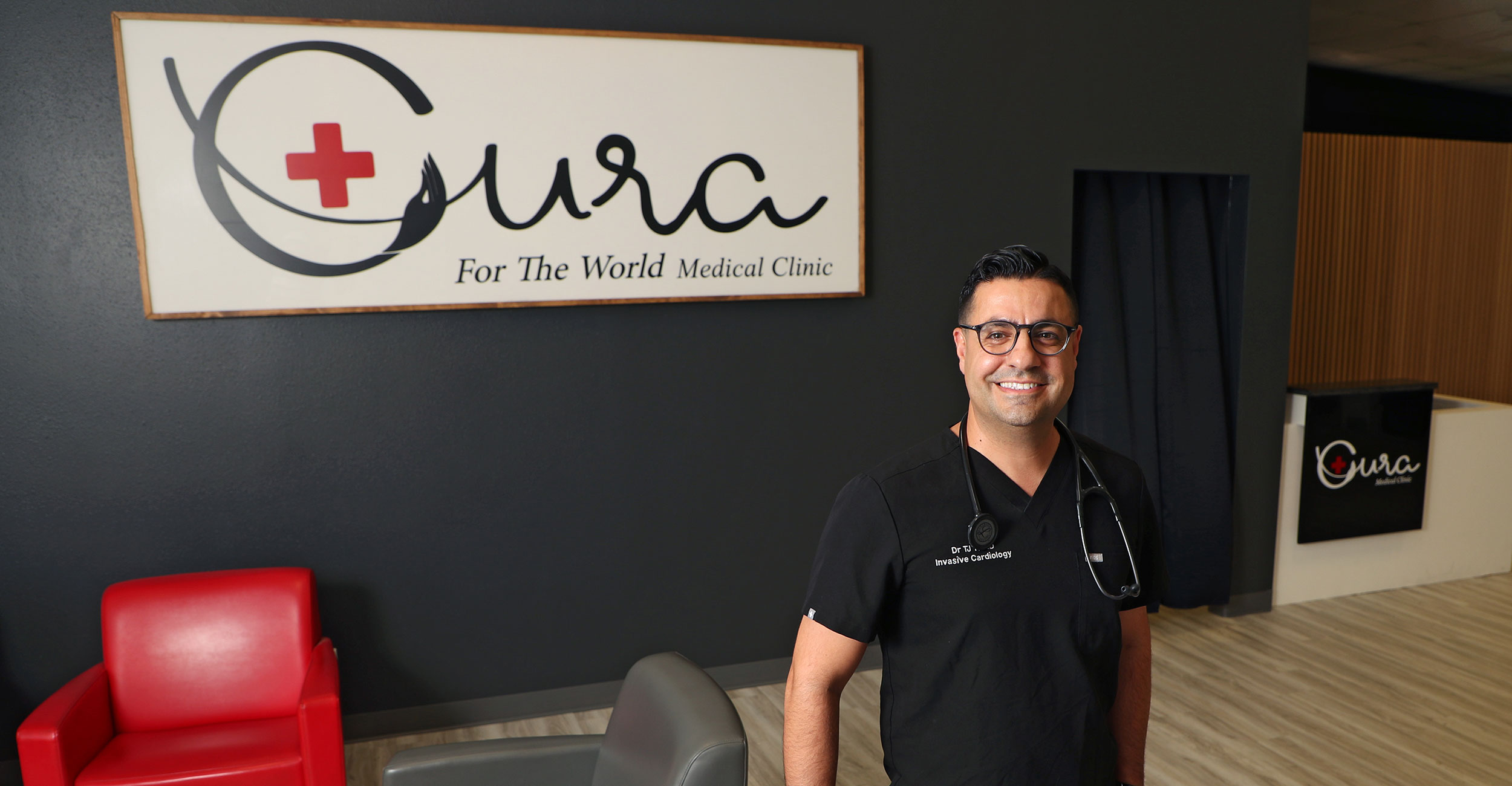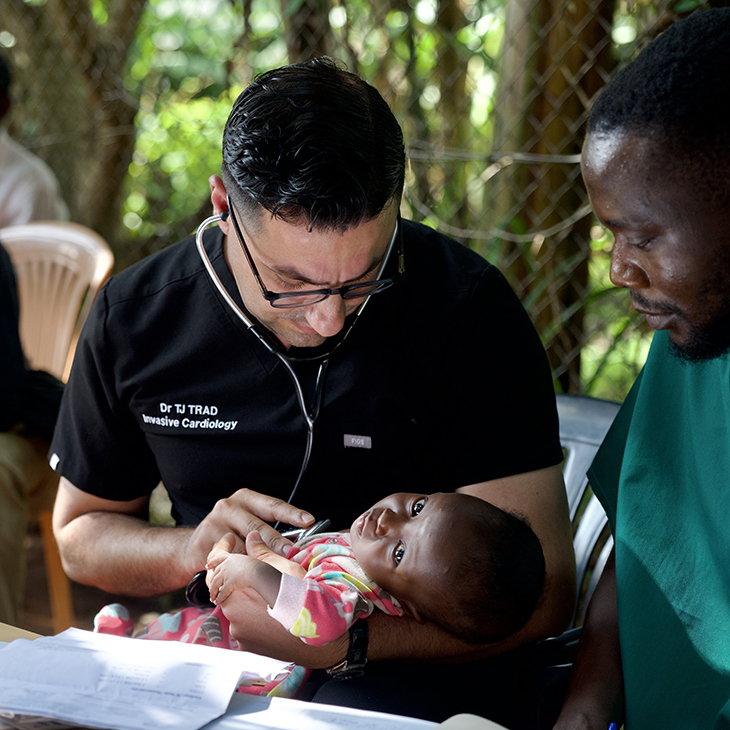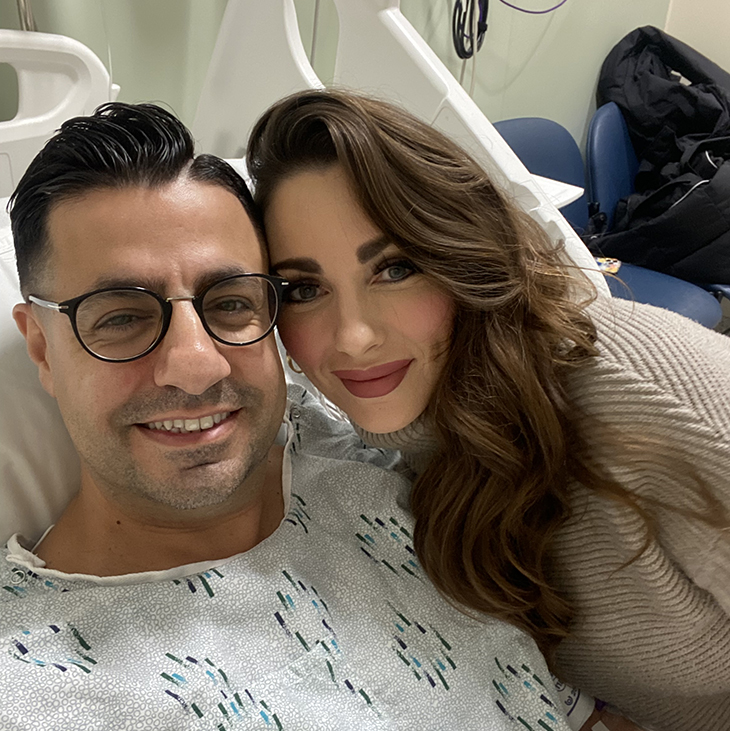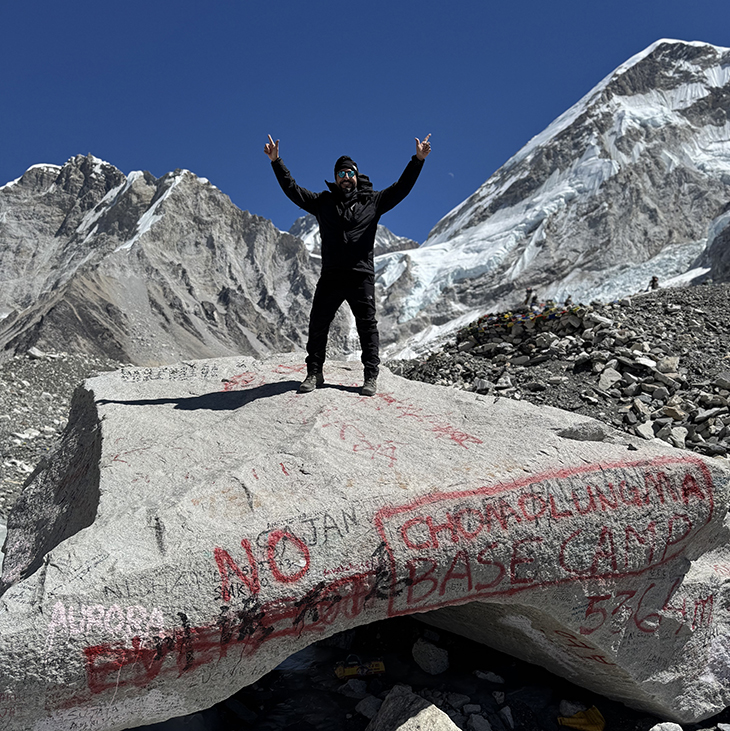
OSU-COM alum, cardiologist uses experience to save life on international flight
Wednesday, July 2, 2025
Media Contact: Sara Plummer | Senior Communications Coordinator | 918-561-1282 | sara.plummer@okstate.edu
Is there a doctor in the house? It’s a line heard repeatedly in movies and television shows — and in real life, apparently.
Oklahoma State University College of Osteopathic Medicine alumnus Dr. TJ Trad was returning from a medical mission trip to Uganda in April 2025 when he responded to the call for a doctor about three hours into his flight because a male passenger was suffering from symptoms of a heart attack.
Trad, an invasive cardiologist at Stillwater Medical Center and the Tulsa Cardiology Clinic, said the patient was drenched in sweat and rated his pain a 10 out of 10.
“He then asked, ‘Am I going to die?’ And the first thing that came to mind was, ‘Not today,’” he said.
Trad, who also founded the nonprofit global health initiative Cura for the World, was traveling with its medical team alongside the nonprofit Project Orphans. Because it was a medical trip, he had a lot of the medications needed to help treat the passenger, including aspirin, nitroglycerin, statins, a beta blocker, a blood thinner and ACE inhibitors.
“I had all the guideline-directed medical therapies with me. It’s what you give someone in an ER in Tulsa,” he said. “We had an AED, in case he needed that, we could shock him. I had a portable ultrasound machine. I had an EKG machine; I had a blood pressure cuff and pulse oximeter. A device called KardiaMobile that we used to check for arrhythmia.”
Trad said there is a spectrum of heart attacks with different levels of severity from STEMI and NSTEMI, where the coronary artery is completely or partially blocked, to a less severe unstable angina, or UA, that occurs suddenly and blood flow to the heart is reduced due to plaque in the arteries.
“He had all the risk factors: he was diabetic, he had high blood pressure, he had high cholesterol, he was in the right age group for something like that to happen,” he said.
“He then asked, ‘Am I going to die?’ And the first thing that came to mind was ‘not
today.’”
Trad had the passenger lie down across a row of seats, administered the necessary medications and checked his vitals every 10 to 15 minutes as his symptoms and chest pain subsided.
“When they have all the risk factors and they tell you they’re having chest pain and they’re sweating, you’re going to treat it like a heart attack. You give them all the medications that we would give them in an ER. The fact that he went from chest pain to no chest pain with medical therapy, we did the right thing,” he said.
The passenger’s symptoms improved enough that the flight didn’t have to divert. The plane was able to land at its original destination, the Amsterdam Airport Schiphol, where an ambulance and medical crew were waiting on the tarmac to take the passenger and his wife to the hospital.
Trad said the passenger was admitted to the hospital for 12 hours and is now doing great.
Cowboy to Cura
Trad’s drive to help people was sparked when he was 9 years old and living in Lebanon with his family. One morning, he woke up with a toothache, so he walked about 5 miles to a United Nations clinic, where a dentist quickly saw him.
“I remember leaving that clinic and thinking to myself, if I can ever do that, that would be the best day of my life. I wanted to be that person, like that doctor who took care of me,” he said.
Trad followed his two older brothers to OSU, where he spent the next 16 years: first, earning his bachelor’s degree in biochemistry, then a master’s in biomedical sciences from OSU Center for Health Sciences and his medical degree from OSU College of Osteopathic Medicine. He completed his internal medicine residency and an invasive cardiology fellowship at OSU Medical Center.
“I graduated from my fellowship on Friday, May 16, 2016, and I filed for a 501c3 for Cura on Monday,” he said.
Cura for the World operates free clinics in Tanzania, Uganda and Peru with plans to build a clinic in Nepal near Mount Everest Base Camp. Cura’s first clinic in the United States opened in Sapulpa, Oklahoma, in 2019.
“You really feel like you’re the ambassador for your city, your state and your school,
and it’s a great feeling.”
Each of the three international clinics sees about 2,000 to 3,000 patients a year and the Sapulpa clinic, operated by volunteers and open two days a week, sees about 16 to 30 patients a week.
“It feels incredibly rewarding. If I could do this full time, that’d be amazing, but I can’t,” Trad said.
“It’s not called the Trad Foundation, it’s called Cura. That creates longevity and sustainability. That’s why it’s not a one-man show. It’s a conglomerate, a bunch of people that are doing the same thing with the same heart for service and they want to help humanity."
When it comes to what makes people feel truly happy and fulfilled, Trad said it’s three things — impact, mentorship and legacy.
“OSU teaches you that very early. It’s like we’re ambassadors for the school if you really think about it. When you go to a developing country and you meet the Minister of Health or someone like that, they ask you, ‘Where did you go to college?’ I went to Oklahoma State, so then you become this reflection of the school that you graduated from. And it’s really cool,” he said. “You really feel like you’re the ambassador for your city, your state and your school, and it’s a great feeling.”
Right place, right time
Helping the passenger on the plane brought to mind Trad’s own history with heart attacks.
In February 2024, Trad was in the middle of performing a procedure at Stillwater Medical Center when he started showing symptoms of a UA heart attack.
“I was sweating, I had chest pain. Obviously, me being a cardiologist and knowing that my uncle and grandfather had heart attacks in their 40s, I thought, is this what I think it is?” he said.
He finished the procedure and immediately had a cardiac CT scan ordered, which found an 80% blockage in one of his arteries, so a stent was put in to relieve the blockage.
“I was supposed to go to Uganda that Monday, and this happened on the Friday before, so I canceled the trip,” he said.
Trad said recovery was slow and steady, but just a few weeks after his heart attack, he started training to climb to Everest Base Camp, and on the one-year anniversary of his stent procedure, he made the climb to base camp.
“I probably wouldn’t have climbed it if it wasn’t for my cardiac event. It inspired me to do something drastic from a health and physical standpoint,” he said. “I have a 4-year-old son and I want to leave a healthy message for him — to love life to the fullest and have a grand adventure despite any life challenges.”
It was on that trip to Everest Base Camp, that Trad learned about the need for a clinic in that part of Nepal as well as about a porter who had been injured. Because the porter couldn’t work, he couldn’t afford to send his daughter, who is deaf and mute, to the boarding school where she is educated and receives the medical care she needs. So, Trad said Cura’s foundation would cover the cost of her schooling until the porter recovered.
On the recent trip to Uganda in April, which Trad rescheduled from the previous year, he diagnosed an 8-month-old girl with a ventricular septal defect — a small hole in the heart. The money has now been raised to perform the procedure to repair the defect.
While flying home from that same Uganda trip, Trad treated the passenger who was having chest pains.
“Maybe me not going last year put me at a place where I go this year, specifically to save not only that girl in Uganda, but maybe that guy on the plane too,” he said. “I was there to help the porter’s daughter who’s deaf and mute, I was there to help that 8-month-old girl with the ventral defect, and the guy on the plane. In retrospect, maybe what happened to me was a good thing.”



